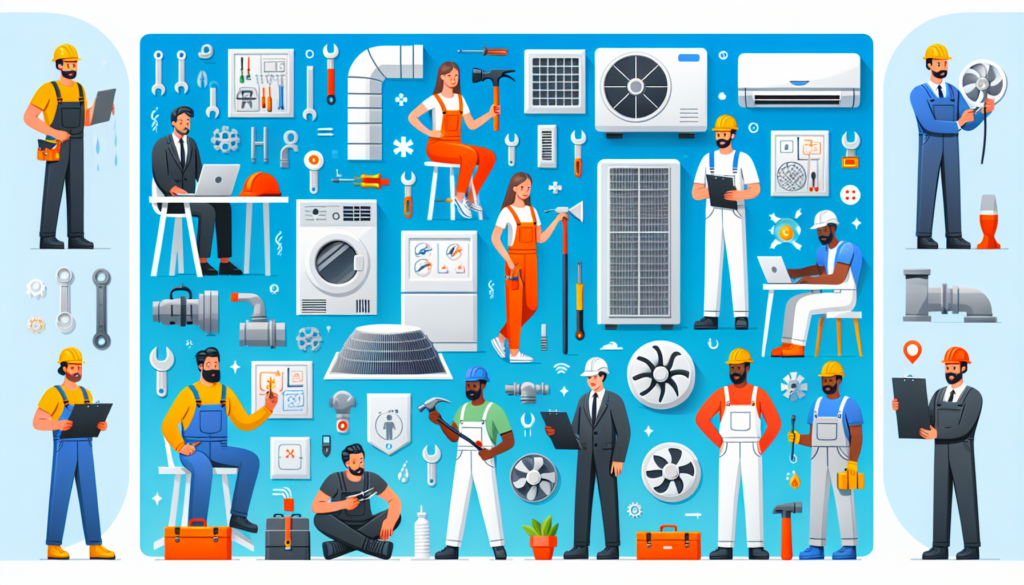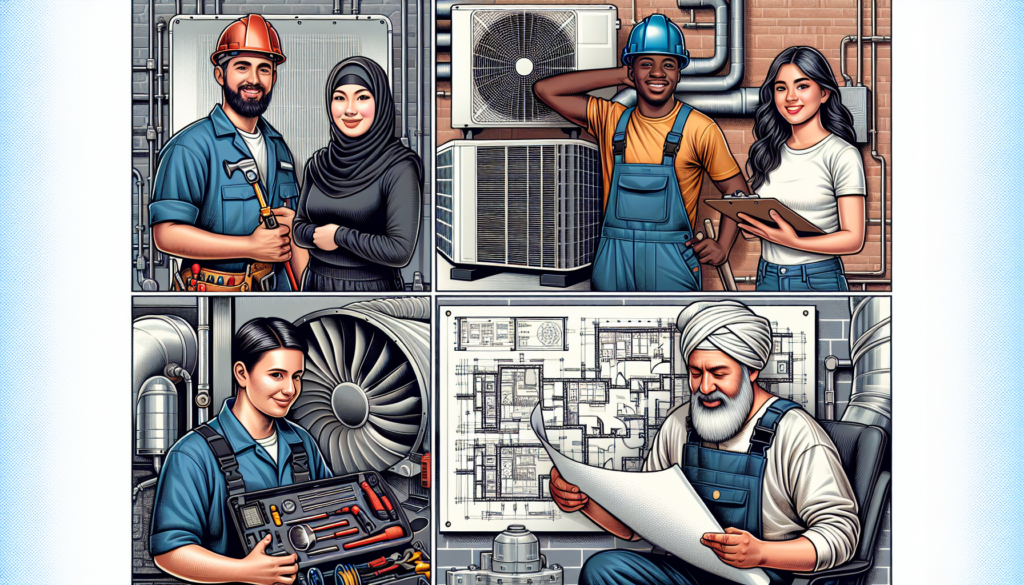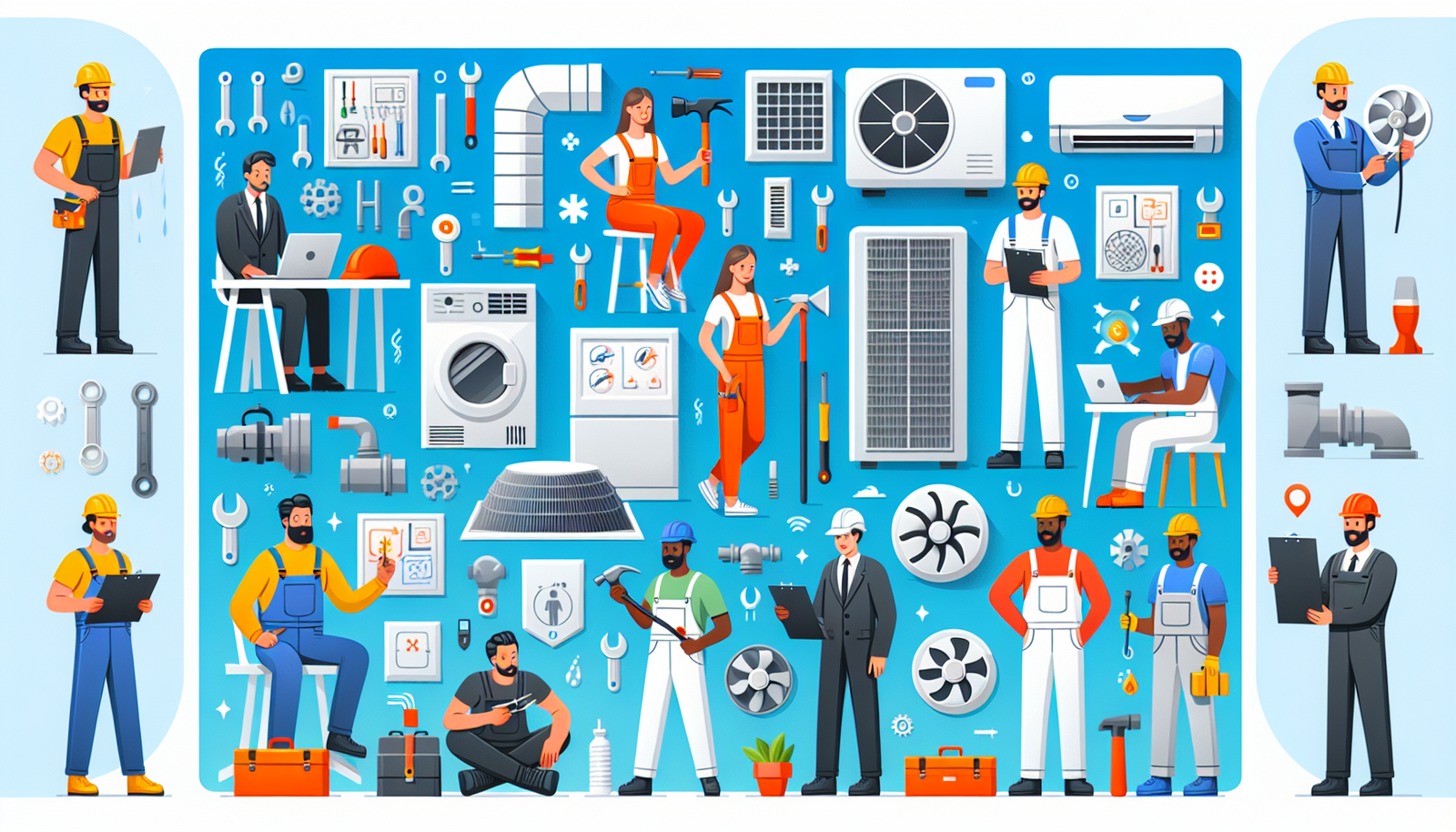If you’re looking to kickstart your career in the HVAC industry, you’re in luck! We’ve compiled a list of 10 entry-level HVAC jobs that you should definitely consider applying for. From installation technicians to maintenance assistants, these positions offer promising opportunities for those who are just starting out. So whether you’re a recent graduate or simply seeking a career change, explore these HVAC job options and pave your way to a fulfilling and rewarding career in the heating, ventilation, and air conditioning field.

1. HVAC Technician
As an HVAC Technician, your role will involve the installation, maintenance, and repair of heating, ventilation, and air conditioning systems. You will be responsible for ensuring that these systems are running efficiently, providing comfortable environments for both residential and commercial spaces.
Installation and maintenance tasks will be a major part of your job as an HVAC Technician. This includes installing new HVAC systems in buildings, as well as connecting and assembling equipment and components. You will also be required to read blueprints and follow specifications to ensure that the systems are installed correctly.
Diagnosing and repairing HVAC equipment is another crucial aspect of your role. You will need to utilize your knowledge of HVAC systems to identify and resolve any issues that may arise. This may involve testing the systems to ensure their proper operation, as well as making necessary repairs to optimize their performance.
Performing routine maintenance tasks is also an important responsibility of an HVAC Technician. This includes cleaning and replacing filters and other components to prevent the build-up of dust and debris. Regular inspection and testing of equipment is necessary to identify potential issues and address them promptly.
Ensuring compliance with safety and environmental regulations is essential as an HVAC Technician. You will need to stay updated on the latest regulations and follow best practices to maintain a safe working environment. This includes proper handling and disposal of hazardous materials and adherence to safety protocols.
2. HVAC Installer
As an HVAC Installer, your main focus will be on the installation of HVAC systems in both new construction and existing buildings. You will be responsible for ensuring that these systems are properly installed and meet the specific requirements of each project.
Reading blueprints and following specifications is a critical part of your role as an HVAC Installer. This will help you understand the layout and design of the HVAC system in order to install it correctly. It is important to pay close attention to the details and ensure that all components are assembled accurately.
You will be responsible for assembling and connecting HVAC equipment and components. This involves using specialized tools and techniques to ensure a secure and efficient installation. Your expertise in this area will allow you to effectively and safely connect various elements of the HVAC system.
Testing systems to ensure proper operation is another important task as an HVAC Installer. This involves checking for any leaks or malfunctions and making any necessary adjustments. Your attention to detail will be vital in identifying any issues and ensuring that the system functions optimally.
3. HVAC Sales Representative
As an HVAC Sales Representative, your role will involve promoting and selling HVAC equipment and services to potential customers. You will be the main point of contact for customers, helping them understand their options and providing them with the necessary information to make informed decisions.
Identifying customer needs and offering appropriate solutions will be a key aspect of your role. You will need to have a strong understanding of different HVAC systems and be able to assess the specific requirements of each customer. This will allow you to recommend the most suitable products and services.
Preparing sales proposals and negotiating contracts are important skills for an HVAC Sales Representative. You will need to accurately assess the costs and benefits of various options and present them to customers in a clear and persuasive manner. Effective negotiation skills will help you secure favorable contracts and agreements.
Providing technical assistance and support to customers is another crucial part of your role. You will need to be available to answer any questions or concerns that customers may have about their HVAC systems. Your expertise will help them troubleshoot issues and ensure that their systems perform optimally.
4. HVAC Maintenance Technician
As an HVAC Maintenance Technician, your main responsibility will be to perform preventive maintenance on HVAC systems. This involves regular inspections, cleaning, and replacement of filters and other components to ensure optimal system performance.
Cleaning and replacing filters and other components is a critical task for an HVAC Maintenance Technician. This helps to prevent the build-up of dust and debris, which can affect the efficiency and performance of the system. Regular cleaning and replacement will ensure that the system operates effectively.
Inspecting and testing equipment to identify potential issues is another important aspect of your role. By conducting thorough inspections, you can identify any signs of wear and tear or potential malfunctions. Testing equipment will help you pinpoint any issues and address them promptly before they escalate.
Making necessary repairs to ensure optimal system performance is a key responsibility as an HVAC Maintenance Technician. You will need to have a strong understanding of HVAC systems and be able to troubleshoot and repair any issues that arise. Timely repairs will help prevent further damage and maintain the system’s efficiency.

5. HVAC Controls Technician
As an HVAC Controls Technician, your role will involve installing, programming, and troubleshooting HVAC control systems. These systems play a crucial role in controlling and regulating the operation of HVAC equipment to optimize energy efficiency.
Installing, programming, and troubleshooting HVAC control systems will require a strong technical understanding of these systems. You will need to follow instructions and specifications to ensure that the systems are installed correctly and programmed for optimal performance.
Testing and calibrating sensors and other control devices is an important task for an HVAC Controls Technician. This involves measuring and adjusting the sensors to ensure accurate readings and proper functionality. Your attention to detail will be critical in maintaining the accuracy and efficiency of the control system.
Monitoring and adjusting system settings to optimize energy efficiency are key responsibilities as an HVAC Controls Technician. By regularly monitoring the system, you can identify any areas where energy efficiency can be improved and make the necessary adjustments. This will help reduce energy consumption and lower operational costs.
Collaborating with other technicians and engineers on control system projects is another important aspect of your role. This requires effective communication and teamwork to ensure that the control system is integrated seamlessly with other HVAC components. Collaboration will help you address any technical challenges and achieve optimal system performance.
6. HVAC Service Technician
As an HVAC Service Technician, you will be responsible for responding to customer service calls and inquiries related to HVAC systems. Your role will involve diagnosing and resolving issues, performing emergency repairs, and educating customers about proper system operation and maintenance.
Responding to customer service calls and inquiries is a crucial aspect of your role as an HVAC Service Technician. Prompt and helpful communication with customers will help establish trust and confidence in your services. You will need to listen to their concerns and provide accurate information and assistance.
Diagnosing and resolving HVAC system issues will require a strong understanding of HVAC systems and troubleshooting techniques. You will need to assess the symptoms reported by customers, conduct thorough inspections, and identify the underlying cause of the issue. Your expertise will help you provide effective solutions and restore the system’s functionality.
Performing emergency repairs and system troubleshooting will be an important part of your role. Sometimes HVAC systems may experience sudden breakdowns or malfunctions, requiring immediate attention. Your ability to quickly diagnose the problem and make efficient repairs will be vital in minimizing downtime and restoring comfort for the customers.
Educating customers about proper system operation and maintenance is another crucial responsibility of an HVAC Service Technician. This includes providing guidance on regular maintenance tasks, such as cleaning and filter replacement, as well as educating them on energy-saving practices. Your expertise will help customers optimize the performance and longevity of their HVAC systems.
7. HVAC Mechanic
As an HVAC Mechanic, your role will involve repairing and maintaining various HVAC equipment to ensure their proper functioning. You will be responsible for identifying and replacing faulty parts, as well as reassembling and testing components to ensure optimal performance.
Repairing and maintaining various HVAC equipment is a key responsibility of an HVAC Mechanic. This includes working with specialized tools and equipment to assess and repair the different components of the system. Your knowledge and expertise will help identify any issues and make necessary repairs.
Reassembling and testing components to ensure proper functioning is another important aspect of your role. After repairing or replacing parts, you will need to reassemble the components and ensure that they are working correctly. This includes checking for any leaks, malfunctions, or abnormalities and addressing them promptly.
Identifying and replacing faulty parts requires a good understanding of HVAC systems and their components. You will need to conduct thorough inspections and tests to determine which parts are malfunctioning and need to be replaced. Your attention to detail will be crucial in maintaining the overall functionality of the system.
Working with specialized tools and equipment is an essential part of being an HVAC Mechanic. This includes using diagnostic tools, power tools, and other equipment to assess, repair, and maintain HVAC equipment. Proper use and care of these tools will be necessary to ensure accurate results and promote safety.
8. Ductwork Installer
As a Ductwork Installer, your main responsibility will be to measure, cut, and install ductwork in residential or commercial buildings. You will be responsible for ensuring that the ducts and vents are properly installed and sealed for airtightness.
Measuring and cutting sheet metal to fabricate ductwork is a critical task for a Ductwork Installer. Precision and accuracy are key, as the ductwork needs to fit perfectly into the designated spaces. Your attention to detail will be vital in ensuring that the fabricated ductwork meets the required specifications.
Installing ducts and vents in residential or commercial buildings will require expertise in handling and installing different types of ductwork. You will need to follow the specific guidelines and design plans to ensure proper installation. This includes connecting the ducts securely and positioning the vents appropriately.
Sealing joints and connections for airtightness is a crucial aspect of your role as a Ductwork Installer. Proper sealing prevents air leaks, improving the overall efficiency of the HVAC system. Your knowledge of sealing techniques and materials will help create airtight connections and ensure optimal air distribution.
Testing ventilation systems for optimal air flow is another important responsibility as a Ductwork Installer. This involves checking for any obstructions or restrictions that may affect the air flow. Your attention to detail will help identify and address any issues, ensuring that the system operates efficiently.
9. Refrigeration Technician
As a Refrigeration Technician, your role will involve repairing and maintaining refrigeration systems. This includes installing and charging refrigerant in cooling units, identifying and fixing electrical and mechanical issues, and ensuring compliance with refrigerant handling regulations.
Repairing and maintaining refrigeration systems is a key responsibility of a Refrigeration Technician. This includes diagnosing issues, repairing faulty parts, and ensuring that the systems are functioning optimally. You will need to have a strong understanding of refrigeration systems and be able to troubleshoot and fix any malfunctions.
Installing and charging refrigerant in cooling units is a critical task for a Refrigeration Technician. You will need to follow the manufacturer’s instructions and safety guidelines to ensure proper installation and charging. Compliance with refrigerant handling regulations is essential to protect the environment and ensure safety.
Identifying and fixing electrical and mechanical issues will require a solid understanding of refrigeration systems and their components. You will need to conduct thorough inspections and tests to pinpoint any issues and determine the appropriate solution. Your expertise will help restore the functionality of the refrigeration systems.
Ensuring compliance with refrigerant handling regulations is an important aspect of your role. You will need to stay updated on the latest regulations and follow best practices to prevent environmental damage and ensure safety. Proper handling, storage, and disposal of refrigerants are critical to maintain compliance.
10. Energy Auditor
As an Energy Auditor, your role will involve conducting energy audits to evaluate HVAC system efficiency. You will be responsible for analyzing energy usage, recommending improvements, performing calculations and simulations, and preparing comprehensive reports for clients.
Conducting energy audits to evaluate HVAC system efficiency is a crucial responsibility of an Energy Auditor. This involves assessing the overall performance of the system, analyzing energy consumption, and identifying areas for improvement. Your expertise will help clients optimize energy efficiency and reduce operational costs.
Analyzing energy usage and recommending improvements is another important aspect of your role. This includes assessing the energy consumption patterns and identifying any inefficiencies or areas where energy can be saved. Based on your analysis, you will be able to recommend specific improvements to clients, such as upgrading equipment or implementing energy-saving practices.
Performing calculations and simulations to assess energy savings will require a strong understanding of HVAC systems and energy efficiency principles. You will need to use specialized software to model the potential energy savings from proposed improvements. Your calculations and simulations will help clients make informed decisions about energy-saving measures.
Preparing comprehensive reports and presenting findings to clients is a key responsibility as an Energy Auditor. You will need to compile all the data, analysis, and recommendations into a clear and concise report. Presenting the findings to clients in an easy-to-understand manner will help them understand the potential benefits and make informed decisions.
In conclusion, the field of HVAC offers a wide range of entry-level job opportunities. Whether you choose to become an HVAC Technician, Installer, Sales Representative, Maintenance Technician, Controls Technician, Service Technician, Mechanic, Ductwork Installer, Refrigeration Technician, or Energy Auditor, there are plenty of avenues to explore. Each role has its own set of responsibilities and requirements, and the HVAC industry is constantly evolving, presenting new challenges and opportunities. By choosing a career in HVAC, you can contribute to the comfort and well-being of individuals and businesses while enjoying a fulfilling and rewarding job.

